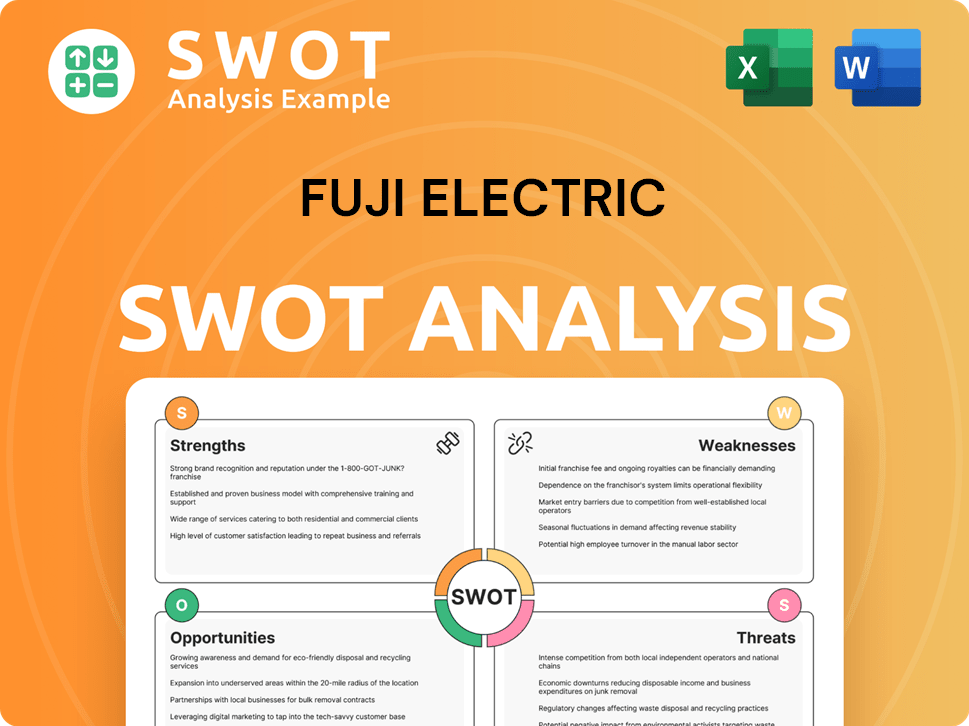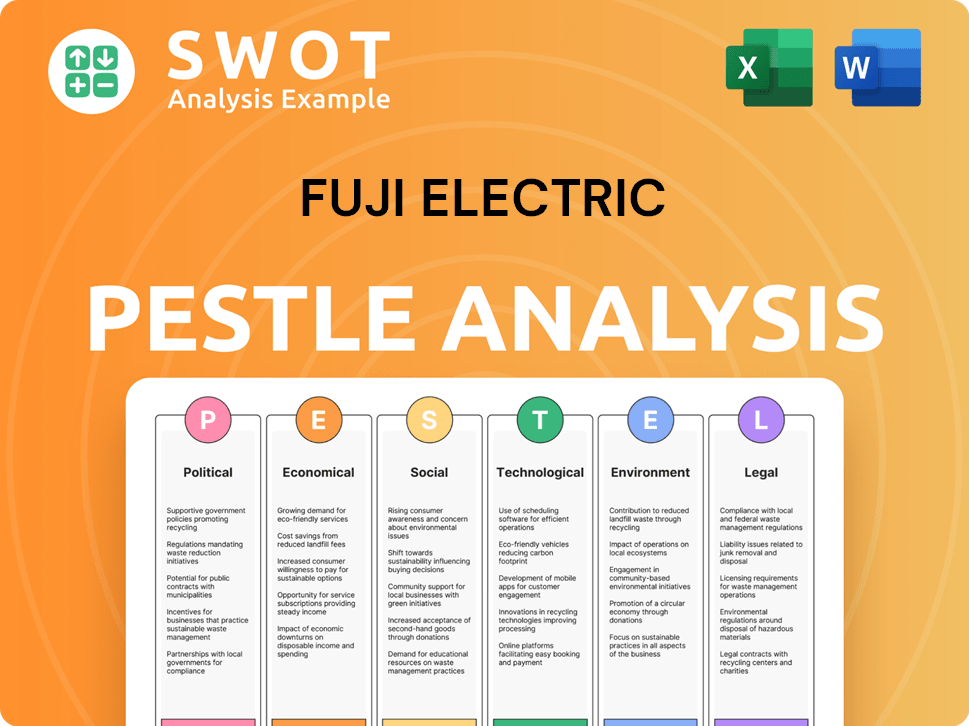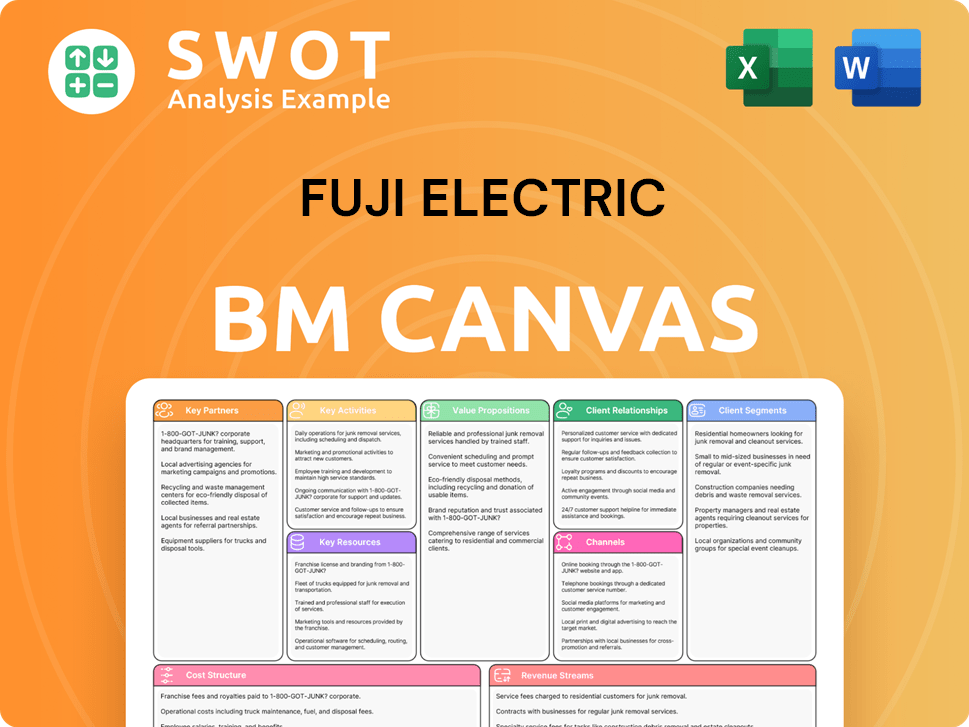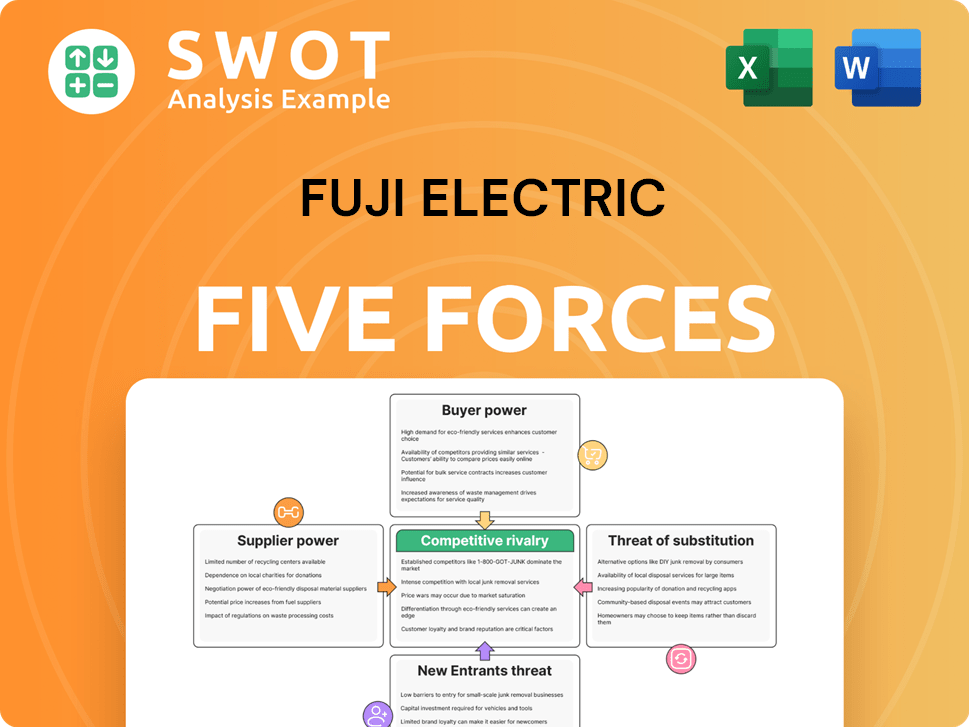Fuji Electric Bundle
How Does Fuji Electric Power Its Sales and Marketing Success?
Founded in 1923, Fuji Electric has evolved from a pioneer in energy and thermal technology to a global leader. With a focus on innovation, particularly in power semiconductors and electronics, Fuji Electric has significantly contributed to clean energy and industrial automation. This exploration delves into the Fuji Electric SWOT Analysis, offering a comprehensive look at its sales and marketing strategies.

This analysis will explore the company's approach to the market, examining its sales strategy, marketing plan, and how it navigates a competitive landscape. We'll dissect Fuji Electric's business model and its methods for reaching target market segments, including its digital marketing initiatives and global sales presence. Understanding Fuji Electric's sales and marketing strategy provides valuable insights for anyone interested in the energy sector and its future.
How Does Fuji Electric Reach Its Customers?
The sales channels of Fuji Electric are designed to cater to its global and industrial focus. The company primarily uses direct sales teams, wholesale distributors, and strategic partnerships to reach its business-to-business (B2B) customers. This approach is well-suited for its specialized products, including power electronics systems, semiconductors, and factory automation equipment, which are essential for industrial and social infrastructure.
A key element of the Fuji Electric sales strategy is global business expansion, with a strong emphasis on local design and production for local consumption. This is particularly evident in Asia, including India and Southeast Asia, where the company aims to increase sales of its components and systems. The evolution of these channels involves strengthening system proposals and boosting local production, especially in emerging markets.
In fiscal year 2024, Fuji Electric marketing strategy included expanding its business in India, promoting localization for small power supplies, and developing global products such as industrial low-voltage inverters. The company aims to increase the local production and consumption rate of major components from 38% in fiscal 2023 to 70% in fiscal 2026. Customer satisfaction is also a priority, with call centers in Japan and other countries providing 24/7 support.
Direct sales teams are a crucial part of Fuji Electric's sales strategy, allowing for direct engagement with key clients and providing tailored solutions. These teams focus on building strong relationships and understanding the specific needs of industrial customers. This approach is particularly effective for complex products and systems.
Wholesale distributors play a vital role in expanding Fuji Electric's market reach, especially in regions where direct sales coverage is limited. These distributors handle the distribution of products, ensuring availability and accessibility for a wide range of customers. They also offer local support and expertise.
Strategic partnerships are essential for Fuji Electric's growth, particularly in expanding its reach in the green transformation (GX) and digital transformation (DX) markets. These partnerships help the company leverage complementary strengths and access new markets. They also facilitate the development of integrated solutions.
Fuji Electric places a strong emphasis on customer satisfaction, providing 24/7 support through call centers in Japan and other countries. This commitment to customer service helps build trust and loyalty. The company's focus on improving service quality and efficiency enhances its value proposition.
The company's Fuji Electric business strategy focuses on several key initiatives to drive growth and enhance its market position. These initiatives include expanding its presence in emerging markets, particularly in India and Southeast Asia, and strengthening its existing capabilities to provide enhanced value to customers.
- Focus on local production and consumption to reduce costs and improve efficiency.
- Promoting localization for small power supplies and developing global products.
- Strengthening partnerships to expand market reach in the GX and DX markets.
- Improving the quality and efficiency of service offerings to enhance customer satisfaction.
Further insights into the Fuji Electric market and its target segments can be found in the Target Market of Fuji Electric article.
Fuji Electric SWOT Analysis
- Complete SWOT Breakdown
- Fully Customizable
- Editable in Excel & Word
- Professional Formatting
- Investor-Ready Format

What Marketing Tactics Does Fuji Electric Use?
The marketing tactics employed by Fuji Electric are primarily digital, focusing on building brand awareness, generating leads, and driving sales within the industrial and social infrastructure sectors. Their approach is heavily influenced by their commitment to innovation in energy and environmental technology. This focus is evident in their digital initiatives and content marketing strategies.
Fuji Electric's marketing strategy emphasizes digital transformation (DX) and Industrial Internet of Things (IIoT) solutions, suggesting a robust digital marketing infrastructure aimed at lead generation and customer engagement, particularly in the B2B space. The company supports digital transformation through advanced technology solutions, facilitating seamless asset integration and access to vital performance data for businesses. This approach likely involves data-driven strategies to understand customer needs and segment their diverse industrial clientele, enabling personalized communication.
The company's commitment to sustainability is also a significant aspect of its marketing, with its 'Environmental Vision 2050' and CDP A-List recognition being key talking points. These initiatives highlight their dedication to environmental responsibility, which is a crucial element of their brand identity and marketing messages. To gain more insights, you can explore the Competitors Landscape of Fuji Electric.
Fuji Electric leverages its corporate website to provide comprehensive product and solution information. They also use online platforms for investor relations and financial disclosures, such as their FY2024 and FY2025 financial results. This approach ensures transparency and accessibility for stakeholders.
The company engages in content marketing by publishing reports like the Fuji Electric Report 2024 and Integrated Report 2024. These reports detail business strategies, sustainability initiatives, and financial performance, serving as key communication tools.
Their marketing efforts likely involve data-driven approaches to understand customer needs and segment their diverse industrial clientele. This enables personalized communication regarding energy efficiency, automation, and sustainable development.
The company's focus in 2024 is to strengthen existing capabilities to provide enhanced value to customers, including adapting to new technologies like digital learning tools. This approach is designed to improve customer engagement and satisfaction.
Fuji Electric's commitment to sustainability is a significant aspect of its marketing, with its 'Environmental Vision 2050' and CDP A-List recognition being key talking points. These initiatives highlight their dedication to environmental responsibility.
Traditional media, such as industry events and print publications, would also be crucial for a company operating in industrial sectors, though specific examples are not provided. These channels are essential for reaching specific target audiences.
Fuji Electric's marketing tactics are centered around digital channels and content marketing to build brand awareness and generate leads. They focus on providing detailed information about their products and solutions, particularly in the areas of energy and environmental technology. The company's strategy is designed to engage with its target audience in the B2B market.
- Digital Platforms: Utilizing their corporate website and online platforms for investor relations and financial disclosures.
- Content Marketing: Publishing reports like the Fuji Electric Report 2024 and Integrated Report 2024 to detail business strategies and financial performance.
- Data-Driven Approaches: Employing data to understand customer needs and segment the diverse industrial clientele for personalized communication.
- Sustainability Focus: Highlighting their 'Environmental Vision 2050' and CDP A-List recognition.
- Customer Engagement: Strengthening existing capabilities to provide enhanced value to customers, including adapting to new technologies like digital learning tools.
Fuji Electric PESTLE Analysis
- Covers All 6 PESTLE Categories
- No Research Needed – Save Hours of Work
- Built by Experts, Trusted by Consultants
- Instant Download, Ready to Use
- 100% Editable, Fully Customizable

How Is Fuji Electric Positioned in the Market?
The brand positioning of the company centers on its commitment to energy and thermal technology, emphasizing its role in fostering a sustainable society. Its core message focuses on delivering innovative and reliable technologies that boost energy efficiency and support sustainable development. This approach is designed to contribute to a decarbonized and recycling-oriented society, in harmony with nature. This strategy is crucial for understanding the overall Fuji Electric sales strategy and its approach to the market.
The company differentiates itself through its expertise in power electronics and power semiconductors, critical for high power conversion efficiency across various sectors. This differentiation is supported by its long history since 1923, building trust and credibility. The brand's visual identity and tone likely reflect professionalism, reliability, and forward-thinking, consistent with its focus on advanced technology and environmental stewardship. Understanding this is key to analyzing the Fuji Electric marketing strategy.
The company appeals to its target audience—primarily businesses and industries—by providing solutions that address critical societal issues such as energy efficiency and automation, all contributing to a sustainable future. Its recognition as a CDP 2024 Climate Change A List company for the sixth consecutive year reinforces its commitment to sustainability. This is a key aspect of its Fuji Electric strategy and how it positions itself in the market. For more insights, see the Growth Strategy of Fuji Electric.
Emphasizes innovative and reliable technologies for energy efficiency and sustainable development. This message targets a decarbonized and recycling-oriented society. This is a fundamental aspect of the company's brand positioning.
Expertise in power electronics and power semiconductors. These technologies enable high power conversion efficiency across various applications. This technological advantage is central to the company's competitive edge.
Primarily businesses and industries seeking solutions for energy efficiency, stable energy supply, and automation. This focus allows for targeted marketing efforts.
Recognized as a CDP 2024 Climate Change A List company for the sixth consecutive year. This recognition boosts brand perception and demonstrates a strong commitment to environmental responsibility.
The company's brand identity emphasizes professionalism, reliability, and forward-thinking, aligning with its technological focus and environmental stewardship. The corporate slogan, 'To be enthusiastic, ambitious and sensitive,' reflects its team-oriented approach and focus on customer and societal well-being. This consistent messaging across various touchpoints demonstrates a unified brand identity.
- The company's brand identity is consistent across all communication channels.
- The corporate slogan reflects the company's values and team-oriented approach.
- The company continually develops new products and solutions for growing markets.
- The company's approach to branding is crucial for its Fuji Electric business.
Fuji Electric Business Model Canvas
- Complete 9-Block Business Model Canvas
- Effortlessly Communicate Your Business Strategy
- Investor-Ready BMC Format
- 100% Editable and Customizable
- Clear and Structured Layout

What Are Fuji Electric’s Most Notable Campaigns?
The sales and marketing strategy of Fuji Electric centers on key campaigns that drive its business forward, focusing on sustainability, technological innovation, and digital transformation. These initiatives are not isolated marketing events but rather long-term strategic commitments that shape the company's interactions with customers, investors, and the broader market. The company's approach reflects its commitment to growth and leadership in its core sectors.
A central component of Fuji Electric's strategy involves communicating its 'Environmental Vision 2050' and decarbonization goals. This involves promoting clean energy equipment, energy-saving products, and its contribution to reducing societal CO2 emissions. This commitment is a significant 'campaign,' highlighting the company's dedication to sustainability and attracting environmentally conscious customers and investors.
Another critical aspect of Fuji Electric's strategy includes substantial investments in the semiconductor sector, particularly in Silicon Carbide (SiC) power semiconductors. This strategic focus aims to expand output and meet the growing demand, especially from the electric vehicle (EV) market. The launch of new production lines demonstrates its commitment to technological leadership and market expansion, targeting investors, business partners, and industry stakeholders.
Fuji Electric actively promotes its 'Environmental Vision 2050' and related decarbonization goals. This includes its clean energy-related equipment and energy-saving products. The company's continuous presence on the CDP Climate Change A List for six consecutive years showcases the success of this environmental positioning.
Fuji Electric is investing approximately JPY200 billion (about US$1.4 billion) from fiscal years 2024 to 2026 in the semiconductor sector, particularly in Silicon Carbide (SiC) power semiconductors. The launch of a 6-inch wafer production line for SiC power semiconductors in fiscal year 2024 and plans for an 8-inch line by fiscal year 2027 are significant milestones.
Fuji Electric focuses on digital transformation (DX) and Industrial Internet of Things (IIoT) solutions. This includes providing ready-made solutions for manufacturers to facilitate seamless asset integration and access to vital performance data. Collaborations with partners for technology development also contribute to this 'campaign's' visibility and credibility.
In FY2025, Fuji Electric aims to increase sales, focusing on 'FA Components,' 'ED&C Components,' and 'IT Solutions.' Overseas sales are projected to increase by more than 5 billion yen each. The overall revenue growth of Fuji Electric, which saw a TTM revenue of $7.50 billion USD in 2024, indicates the effectiveness of their combined Fuji Electric sales strategy.
The success of these initiatives is measured by increased sales in relevant segments and enhanced market share. Fuji Electric's focus on key areas like FA Components, ED&C Components, and IT Solutions, with projected growth in overseas sales, indicates a strategic approach to expanding its market presence.
- Increased sales in FA Components, ED&C Components, and IT Solutions.
- Enhanced market share in critical component areas.
- Projected increase in overseas sales by more than 5 billion yen each.
- Overall revenue growth, with a TTM revenue of $7.50 billion USD in 2024.
Fuji Electric Porter's Five Forces Analysis
- Covers All 5 Competitive Forces in Detail
- Structured for Consultants, Students, and Founders
- 100% Editable in Microsoft Word & Excel
- Instant Digital Download – Use Immediately
- Compatible with Mac & PC – Fully Unlocked

Related Blogs
- What are Mission Vision & Core Values of Fuji Electric Company?
- What is Competitive Landscape of Fuji Electric Company?
- What is Growth Strategy and Future Prospects of Fuji Electric Company?
- How Does Fuji Electric Company Work?
- What is Brief History of Fuji Electric Company?
- Who Owns Fuji Electric Company?
- What is Customer Demographics and Target Market of Fuji Electric Company?
Disclaimer
All information, articles, and product details provided on this website are for general informational and educational purposes only. We do not claim any ownership over, nor do we intend to infringe upon, any trademarks, copyrights, logos, brand names, or other intellectual property mentioned or depicted on this site. Such intellectual property remains the property of its respective owners, and any references here are made solely for identification or informational purposes, without implying any affiliation, endorsement, or partnership.
We make no representations or warranties, express or implied, regarding the accuracy, completeness, or suitability of any content or products presented. Nothing on this website should be construed as legal, tax, investment, financial, medical, or other professional advice. In addition, no part of this site—including articles or product references—constitutes a solicitation, recommendation, endorsement, advertisement, or offer to buy or sell any securities, franchises, or other financial instruments, particularly in jurisdictions where such activity would be unlawful.
All content is of a general nature and may not address the specific circumstances of any individual or entity. It is not a substitute for professional advice or services. Any actions you take based on the information provided here are strictly at your own risk. You accept full responsibility for any decisions or outcomes arising from your use of this website and agree to release us from any liability in connection with your use of, or reliance upon, the content or products found herein.